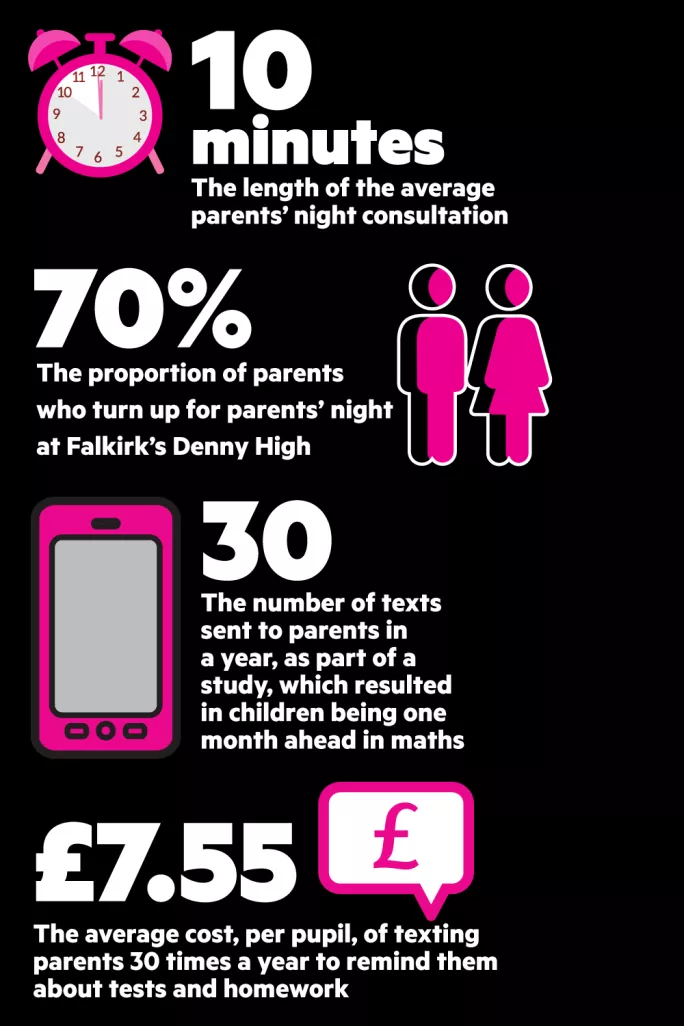- Home
- ‘We want the nightmare of parents’ evenings to end’
‘We want the nightmare of parents’ evenings to end’

Parents’ nights should be abolished because they are a chaotic “nightmare” for teachers and families, the head of a leading parents’ organisation has said.
The traditional 10-minute sit-down is an “institution that fails us all”, said Eileen Prior, chief executive of the Scottish Parent Teacher Council. She claimed that there is rarely time for a proper discussion and that teachers become so bewildered by the events that they can end up talking about the wrong child.
If schools communicated well with parents throughout the year, the meetings would be rendered obsolete, she added.
But the traditional arrangement whereby each parent is given a 10-minute slot with their child’s teacher continues to dominate, Ms Prior told the conference of the education directors’ body ADES.
These individual appointments often run behind schedule, with parents and teachers seldom having enough time to discuss all the issues in their allotted slot. “As a parent, [parents’ nights] are a nightmare and as a teacher - I am not one - but I dare say they are a nightmare, too,” said Ms Prior. “Parents don’t really get the opportunity to share their concerns to any great degree or to ask questions, nor is the teacher really able to.”
“This is an institution in our system that fails us all - parents, pupils and the teaching profession. I’ve never met any parent or any teacher who thinks they are worth doing the way they are done. But we seem to be stuck with them because, ‘This is what we do.’”

‘Kept in the dark’
The focus when engaging with parents should be on learning, not reporting, Ms Prior added. “We shouldn’t be waiting until a parents’ evening to hear that [our children] have not been turning in homework, are not working hard enough or meeting expectations,” she said.
“It’s a bit like inspection. If we communicated effectively all the time, we would not need inspection - and the same goes for parents’ nights. If we communicated more effectively during the course of the school year, we would not need parents’ nights.”
Headteachers, however, hit back, saying that parents’ evenings are just one way of engaging with families in schools, while electronic communication is also taking off as a means of keeping parents up-todate (see boxes, below). The face-to-face contact provided by parents’ night remains vital, they argued.
The chair of the National Parent Forum, Joanna Murray, said that while the format has become tired, parents’ nights are still important. “We shouldn’t get rid of them but I think they could be done better. It’s not really a model fit for the 21st century. So we need to adapt it and change it, but there does need to be a face-to-face element during the year,” she said.
‘We shouldn’t get rid of parents’ evenings, but I think they could be done better.’
Headteacher Willie French has led six primaries and has worked as a school leader for 20 years. He explained that he has held curricular evenings, open days and parent council meetings at his school - Royal High Primary in Edinburgh - but these have tended to attract the same group of 40-50 parents. Parents’ night, however, has always drawn in the crowds, and it is the one time that he can guarantee almost 100 per cent attendance.
“I think parents actually enjoy parental consultations - it’s dedicated time for them to talk with their child’s teacher,” Mr French said.
Stephen Miller, head of Denny High in Falkirk, said that electronic communication has made it easier to keep in touch with parents but, with more than 70 per cent turning up on parents’ night, this shows they value the face-to-face contact with teachers.
Mr Miller, who is also president of secondary headteachers’ organisation School Leaders Scotland, said: “At the end of the day you can’t beat that face-to-face contact with a parent or teacher, and in my own school I think parents would be very loathe to give that up.”
Keep reading for just £1 per month
You've reached your limit of free articles this month. Subscribe for £1 per month for three months and get:
- Unlimited access to all Tes magazine content
- Exclusive subscriber-only stories
- Award-winning email newsletters



